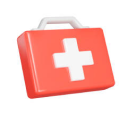Vigabatrin
Uses
What is Vigabatrin for?
Vigabatrin is used to control West’s syndrome (infantile spasms) and other seizures.
How should I take or use Vigabatrin?
Follow the instructions on your medication label and take the medication as prescribed by your doctor.
You can take this medication with or without food.
Swallow the tablet with a glass of water. If you are unable to swallow the tablet, you may crush it and add it to small amount of food (eg. yoghurt, ice-cream, syrup) or water.
You may not experience any benefit immediately after starting the medication as it may take up to a few weeks before this medication can exert its full effects. You should continue to take your medication regularly as instructed by your doctor even if you feel well. Stopping your medication without informing your healthcare professional may cause your condition to worsen quickly.
Do not stop taking or adjust the dose of this medication without consulting your healthcare professional.
What should I do if I forget to take or use Vigabatrin?
If you miss a dose, take the missed dose as soon as you remember. If it is almost time for your next dose, take only the usual dose. Do not double your dose or use extra medication to make up for the missed dose.
Precaution
What precautions should I take when taking or using Vigabatrin?
Inform your healthcare professional if you have the following medical conditions before starting on Vigabatrin:
- Kidney problems
- Any symptoms of depression and/or mood disorder
- Eye problems
- Drug allergies
For women: Tell your doctor if you are pregnant and/or breastfeeding. Your doctor would have discussed the potential benefits and side effects with continuing/starting this medication.
Consult your healthcare professional immediately if your seizures get worse or become different after you start on this medication.
Be careful when driving or operating machinery as this medication may cause drowsiness or blurred vision.
What food or medication should I avoid when I take or use Vigabatrin?
Avoid drinking alcohol while taking this medication as it can cause excessive drowsiness.
Drugs that cause drowsiness can increase the risk of drowsiness when used with vigabatrin.
Side Effects
What are some common side effects of Vigabatrin?
Like all medicines, this medication may cause some possible side effects but not everyone experiences them. Consult your healthcare professional if any of the side effects lasts more than a few days or become severe and bothersome.
The common side effects of vigabatrin include:
-
Dizziness
- Stand up or sit up slowly from a lying or sitting position.
-
Drowsiness
- This may affect your ability to drive and use machinery.
- Make sure your reactions are normal before you drive or do things that require you to be alert.
-
Difficulty in passing stools (Constipation)
- You should have more vegetables and fruits in your diet (at least 2 servings of vegetables and fruits daily) and drink enough water (at least 2 litres or 8 glasses of water daily).
- If your constipation does not get better with self-treatment, you should see your doctor.
-
Loose stools (Diarrhoea)
- Drink plenty of clear fluids to replace those lost (two liters every day).
- Avoid oily or spicy food and milk or daily products.
- You may have foods such as porridge or soups which are gentler on the stomach.
- Take the anti-diarrheal medication (e.g., Loperamide) that the doctor gives you when necessary.
-
Nausea, vomiting
- Take the medication after food, eat small but frequent meals.
- Avoid fatty or spicy food.
-
Headache
- You may take paracetamol to treat the headache.
- Abdominal pain
- Increased appetite and weight
- Throat and/or nose, urinary tract infection
- Reduced field of vision, double vision, abnormal colour perception
- Back and/or joint pain, muscle weakness, numbness in the hands and feet (“pins and needles” sensation)
What are some rare but serious side effects that I need to seek medical advice immediately?
The symptoms of a drug allergy include one or more of the following:
- Swollen face / eyes/ lips / tongue
- Difficulty in breathing
- Itchy skin rashes over your whole body
If you experience any of these symptoms, you should stop your medication and see your healthcare professional immediately.
If the following serious side effects happen, you should consult your healthcare professional immediately:
-
Blistering, peeling, red skin rash due to Stevens-Johnson syndrome (SJS) or Toxic Epidermal Necrolysis (TEN)
- SJS and TEN are rare and serious skin reactions which can happen after using some medications. Symptoms include mouth ulcers, face swelling, blisters on skin, skin rashes that spread throughout the body within hours to days after starting the medication.
- This usually occurs within the first few months (monitor closely for the first 3 months) of treatment.
- Sudden worsening of vision or narrow visual field
- Unusual movement disorder (in children)
In rare cases, this medication may cause the following changes to a person’s mental condition, especially in the first few weeks of treatment or during dose changes:
- Worsening agitation, restlessness, violent behaviour, or
- New or worsening thoughts of harming yourself or ending your life
- Other changes in mood or behaviour
Please inform your doctor as soon as possible, or for your family or caregiver to inform your doctor if you are unable to seek treatment on your own.
Do not stop taking this medication on your own without discussing with your doctor.
It is important to note that your doctor has prescribed this medication as he/ she feels you will benefit more from taking this medication over the possible side effects that it may cause, which have a low chance of occurring. Most people take this medication without any such problems.
Handling
How should I store Vigabatrin?
Store in a cool and dry place, away from direct sunlight. Keep this medication away from children.
How do I throw away Vigabatrin safely?
Pack this medication into a black trash bag and seal it tightly before throwing it into the rubbish chute or bin.
Disclaimers
Please take note that the above is not a complete list of all possible side effects. If you have any concerns about your medication or if you have other side effects that you think are caused by this medication, please consult your doctor or pharmacist.
If you take more than the recommended dose, please seek medical advice immediately. The information provided on this page does not replace information from your healthcare professional. Please consult your healthcare professional for more information.
This article is jointly developed by members of the National Medication Information workgroup. The workgroup consists of cluster partners (National Healthcare Group, National University Health System and SingHealth), community pharmacies (Guardian, Unity and Watsons) and Pharmaceutical Society of Singapore. The content does not reflect drug availability and supply information in pharmacies and healthcare institutions. You are advised to check with the respective institutions for such information.
Last updated on Jan 2025

Need More Medicine?
Use Medicine Order Service on HealthBuddy.

Medicines Reminder
Get reminders and chart progress on HealthBuddy.
© 2025 SingHealth Group. All Rights Reserved.


























































